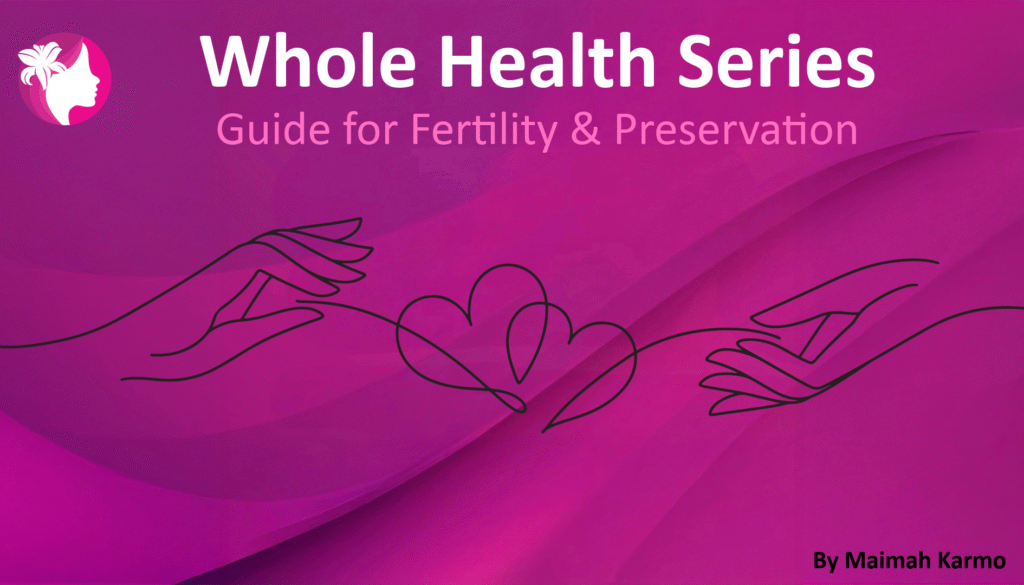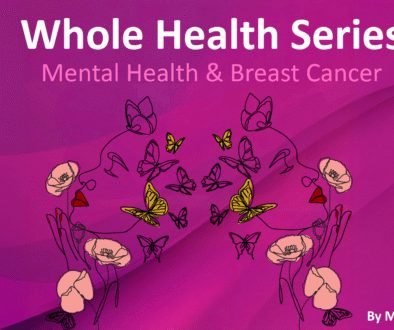Whole Health Series: Guide for Fertility & Preservation
By Maimah Karmo
When you’re diagnosed with cancer, the world stops. The air shifts. The future you imagined suddenly feels out of reach.
When I was told my breast cancer treatment would leave me infertile, the words hit me like a gut punch. I still remember that day, my mind spinning. I peeked into my daughter’s room, later that night watching her sleep. A deep ache washed over me knowing it would be just her and me. I had hoped to give her a house full of siblings.
“I grieved for the children I would never hold. For the pitter-patter of little feet that would never echo through my home. For the bedtime stories, the scraped knees, and the graduations I would never get to witness. Was it my fault? Should I have had children sooner? Was God trying to tell me something? I was 32. I thought I had more time. For a long time, I sat in that grief. And then slowly I began to find hope again.”
~ Maimah Karmo
A cancer diagnosis can shatter more than your health it can disrupt your dreams of building a family. Women, particularly younger women and women from marginalized backgrounds, often face additional barriers:
- Insufficient or late information about options
- Limited access to fertility preservation resources
- Lack of insurance coverage
- Medical bias
These barriers mean too many women are forced to make life-altering decisions, without having all the facts or the resources to act. Here’s what I learned from my journey:
- Empower yourself with knowledge. Understand your diagnosis, your treatment plan, and the fertility preservation options available to you. The more informed you are, the more confident your choices will be.
- Get a second opinion. If you’re uncertain about your doctor’s recommendations, another specialist may offer new possibilities.
- Seek out resources and don’t be afraid to take some time. I can’t speak for everyone, but after my diagnosis, I thought the cancer was growing every second, so I was afraid to wait to find answers. I kept hearing the words aggressive, so took the doctor’s word for it and let my hopes go.
- Build your support circle. Friends, family, and healthcare providers who truly listen and advocate for your needs can be your lifeline – and if you can find a support system of other patients, talk to them and learn what they did, when, why and who they worked with and take all the information you learn into account as you make a decision that’s right for you and your long-term health.
- Speak your truth. Your healthcare team can only address your concerns if they know them, never be afraid to ask questions or express your preferences.
Navigating fertility after a cancer diagnosis is a journey of self-advocacy, and a decision that will impact you for the rest of your life. Explore every option, and use your voice, you reclaim control over your future. Whatever decision you make, know that it’s the best decision you can make with what you know now.
Fertility Preservation: What to Know
Cancer treatments can affect fertility temporarily or permanently. That’s why it’s essential to have conversations before treatment begins about:
- Egg & Embryo Freezing (Cryopreservation): Mature eggs can be frozen unfertilized or fertilized with sperm and stored as embryos.
- Ovarian Tissue Freezing: Still experimental, but an option for some patients, including younger girls.
- Ovarian Transposition: Surgically moving ovaries out of the radiation field.
- Fertility-Sparing Surgery: In select early-stage cancers, part of the reproductive system can be preserved.
- Ovarian Suppression: Hormonal treatment to temporarily pause ovarian function during treatment.
Financial Costs of Fertility:
“I would love to see a shift in fertility coverage by insurance and grants for women who want to use the eggs or embryos they have stored”
~ Shoni Brown MS, ED, Angel Advocate
Fertility preservation is not only an emotional decision; it’s a financial one. For many young breast cancer patients, the high cost of egg or embryo freezing can be a major barrier. Patients often invest significant time, energy, and money in fertility preservation, with studies showing they may spend an average of 125 hours, go through about 2.7 assisted reproductive technology (ART) cycles, and pay around $25,000 over an 18-month period, all without a guaranteed outcome (Frankel et al., 2025). It’s important to know your options early. Patients should ask about fertility referrals as soon as possible after diagnosis and advocate for financial navigation support, including grants, discount programs, or employer-sponsored benefits. Fertility is a deeply personal journey and ensuring affordability is a critical part of equitable care.
Tip: Always ask about potential risks, hidden costs, and success rates, and request a full breakdown of fees.
Helpful Resources to Explore:
- Livestrong Fertility: Discounted medications and services at partner clinics.
- Reprotech’s Verna’s Purse: Reduced rates for egg, embryo, and sperm storage.
- Worth the Wait: Grants for fertility preservation and family building.
- ReUnite RX, HeartBeat, and Fertility LifeLines: Discounted fertility medications.
Your fertility story doesn’t end with cancer. Even if the path looks different than you once imagined, there are still ways forward whether that’s through preservation, surrogacy, adoption, or embracing new definitions of family. I share my story to remind you: you are not alone. You have options. And you have the right to the information, care, and resources that can help you choose the future you want. If you are navigating this journey right now, breathe. Ask the hard questions. Seek the right team. And know that hope is still yours to hold. A few of my friends have adopted one or more children.
My daughter is almost 23 years old. She is my only child and my everything. While I’d hoped to give her siblings, the relationship that we share is profoundly beautiful. I have had nearly 20 more years with her and she with me and we have made each one of those years count and look forward to many more. We have a relationship that has been made even closer because of the gift of each other and when we are sitting together quietly on the sofa reading or watching a movie, we’ll often joke about what it would be like if she had grown up with a house of boys like I did. We laugh about it. It took us both time to accept that I couldn’t give her the house full of siblings she saw that many of her friends had; but we could love the life that we had the blessing to live. Every survivor’s story is different, but I’m confident that you’ll write yours with compassion, love and hope.
To learn more about fertility preservation, resources, and patient support, visit us at www.tigerlilyfoundation.org




